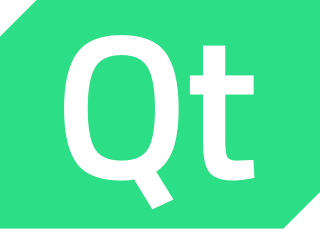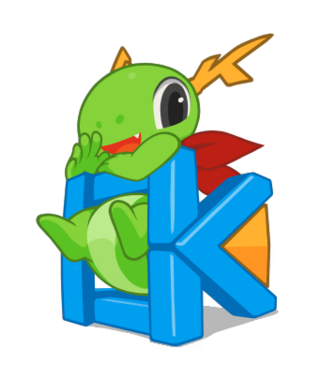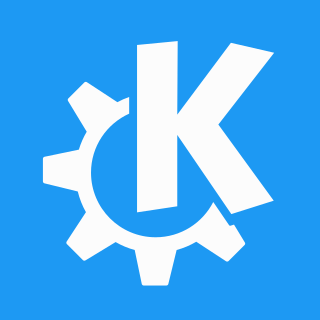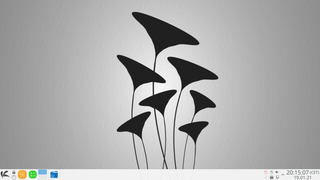
Konqueror is a free and open-source web browser and file manager that provides web access and file-viewer functionality for file systems. It forms a core part of the KDE Software Compilation. Developed by volunteers, Konqueror can run on most Unix-like operating systems. The KDE community licenses and distributes Konqueror under GNU GPL-2.0-or-later.

Qt is cross-platform software for creating graphical user interfaces as well as cross-platform applications that run on various software and hardware platforms such as Linux, Windows, macOS, Android or embedded systems with little or no change in the underlying codebase while still being a native application with native capabilities and speed.

KHTML is a discontinued browser engine that was developed by the KDE project. It originated as the engine of the Konqueror browser in the late 1990s, but active development ceased in 2016. It was officially discontinued in 2023.

KDevelop is a free and open-source integrated development environment (IDE) for Unix-like computer operating systems and Windows. It provides editing, navigation and debugging features for several programming languages, and integration with build automation and version-control systems, using a plugin-based architecture.

Konsole is a free and open-source terminal emulator graphical application which is part of KDE Applications and ships with the KDE desktop environment. Konsole was originally written by Lars Doelle. It ls licensed under the GPL-2.0-or-later and the GNU Free Documentation License.

The KDE Advanced Text Editor, or Kate, is a source code editor developed by the KDE free software community. It has been a part of KDE Software Compilation since version 2.2, which was first released in 2001. Intended for software developers, it features syntax highlighting, code folding, customizable layouts, regular expression support, and extensibility. The text editor's mascot is Kate the Cyber Woodpecker.
XMLGUI is a KDE framework for designing the user interface of an application using XML, using the idea of actions.
This article provides basic comparisons for notable text editors. More feature details for text editors are available from the Category of text editor features and from the individual products' articles. This article may not be up-to-date or necessarily all-inclusive.

Krita is a free and open-source raster graphics editor designed primarily for digital art and 2D animation. The software runs on Windows, macOS, Linux, Haiku, Android, and ChromeOS, and features an OpenGL-accelerated canvas, colour management support, an advanced brush engine, non-destructive layers and masks, group-based layer management, vector artwork support, and switchable customisation profiles.

KDE Platform 4 was a collection of libraries and software frameworks by KDE that served as technological foundation for KDE Software Compilation 4 distributed under the GNU Lesser General Public License (LGPL). KDE Platform 4 was the successor to KDElibs and the predecessor of KDE Frameworks. KDE Platform 4 is the only version of KDE Platform, and in 2013 it was replaced by KDE Frameworks 5.

Kdenlive is a free and open-source video editing software based on the MLT Framework, KDE and Qt. The project was started by Jason Wood in 2002, and is now maintained by a small team of developers.

Frescobaldi is an editor for LilyPond music files. It aims to be powerful, yet lightweight and easy to use. Frescobaldi is free software, freely available under the GNU General Public License. It is designed to run on all major operating systems. It is named after Girolamo Frescobaldi, an Italian composer of keyboard music in the late Renaissance and early Baroque period.

The KDE Software Compilation was an umbrella term for the desktop environment plus a range of included applications produced by KDE. From its 1.0 release in July 1998 until the release of version 4.4 in February 2010, the Software Compilation was simply known as KDE, which stood for K Desktop Environment until the rebrand. The then called KDE SC was used from 4.4 onward until the final release 4.14 in July 2014. It consisted of the KDE Plasma 4 desktop and those KDE applications, whose development teams chose to follow the Software Compilation's release schedule. After that, the KDE SC was split into three separate product entities: KDE Plasma, KDE Frameworks and KDE Applications, each with their own independent release schedules.

LightDM is a free and open-source X display manager that aims to be lightweight, fast, extensible and multi-desktop. It can use various front-ends to draw the user interface, also called Greeters. It also supports Wayland.

Maliit is an input method framework for computers with particular focus on implementing virtual keyboards. Designed mostly for touchscreen devices, Maliit allows the inputting of text without the presence of a physical keyboard. More advanced features such as word correction and prediction are also available.

Phabricator is a suite of web-based development collaboration tools, which includes a code review tool called Differential, a repository browser called Diffusion, a change monitoring tool called Herald, a bug tracker called Maniphest, and a wiki called Phriction.

KDE Frameworks is a collection of libraries and software frameworks readily available to any Qt-based software stacks or applications on multiple operating systems. Featuring frequently needed functionality solutions like hardware integration, file format support, additional graphical control elements, plotting functions, and spell checking, the collection serves as technological foundation for KDE Plasma 5 and KDE Gear distributed under the GNU Lesser General Public License (LGPL).

The KDE Gear is a set of applications and supporting libraries that are developed by the KDE community, primarily used on Linux-based operating systems but mostly multiplatform, and released on a common release schedule.

KDE Projects are projects maintained by the KDE community, a group of people developing and advocating free software for everyday use, for example KDE Plasma and KDE Frameworks or applications such as Amarok, Krita or Digikam. There are also non-coding projects like designing the Breeze desktop theme and iconset, which is coordinated by KDE's Visual Design Group. Even non-Qt applications like GCompris, which started as a GTK-based application, or web-based projects like WikiToLearn are officially part of KDE.

KaOS is a desktop Linux distribution that features the latest version of the KDE desktop environment, the LibreOffice office suite, and other popular software applications that use the Qt toolkit.















